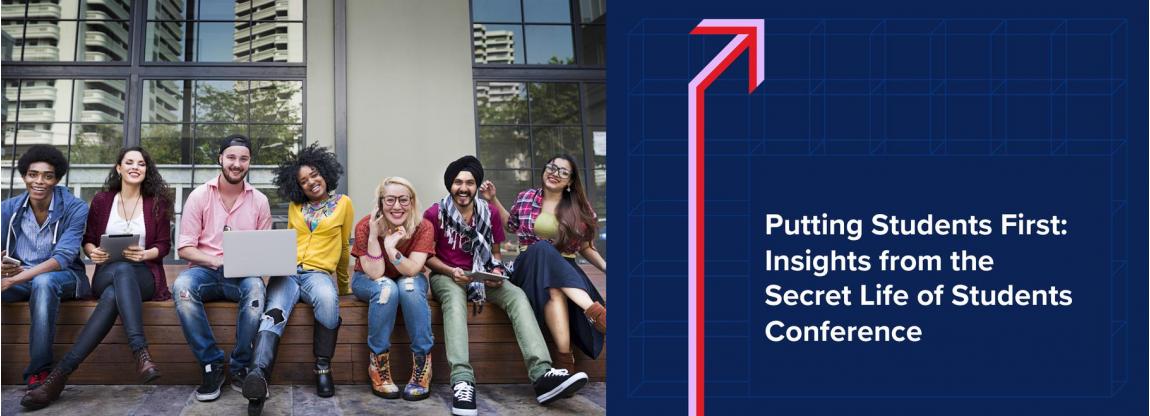Putting students First – Insights from The Secret Life of Students Conference
Now in its third year, Wonkhe’s Secret Life of Students conference brings together experts, sector leaders and professionals, as well as student leaders and students’ union managers, to tackle difficult challenges and work together to transform higher education to better meet the needs of the next generation of students. Emma Hill, McGraw Hill Partnerships Product Manager, shares the main insights she gained from the conference in February 2022.
Wellbeing starts with belonging
The golden thread running throughout the conference was belonging - how belonging is central to wellbeing both for students and staff. Belonging is an important aspect of understanding student engagement; it creates confidence in institutions and academics.
Belonging has long since been associated as a key variable in successful student outcomes, and in a recent research study, while 69% of students recently surveyed agreed they belonged at university, that’s nevertheless a third of students who don’t feel that way. And 68% of those students who didn’t feel like they belong felt they did not deserve to be at university.


Even 32% who felt they belonged did not feel they deserved to be at university. Interestingly, International students are more likely to say they belong than home students. Only half of students with disabilities said they belonged.
Naturally, given the circumstances of the past couple of years, there was discussion around whether online increases or decreases belonging. However here there is no cut and dried answer, with the impact varying depending on the student and their needs. For example, part time or mature students actually benefit from online and hybrid, whereas perhaps full time 18-year-olds living on campus feel like something is missing.
Utilising digital technology to enhance not replace


Technology is the key area in Higher Education most expected to have the greatest change moving forward. Student expectations are part of what’s driving this change. The pandemic prompted a need to utilise technology to replace the existing ways of teaching and learning, but as we start to come out of that place, it’s important to explore the possibilities and opportunities created from using technology to improve how students engage with learning. It’s also important to highlight that it needs to be pedagogically appropriate and helpful to students, considering learning outcomes first, then applying technology, as opposed to technology first.
Strategically, technology can support with EDI, wellbeing, curriculum development, assessment, data. More personalised learning during the pandemic gave students permission to ask for what they want; now the seamlessness of using different digital tools needs to be better integrated. York University shared how for them, technology is not about replacing anything or anyone but augmenting the student experience.
However, along with the benefits of data collection for monitoring attendance and performance, there also comes an obligation to create and adhere to a code of practice on using student data. At York, they have created a Digital portfolio group, digital education steering group and user experience team to talk to staff and students, to make sure this is all handled in the best possible way.
A final point was that given the exciting opportunities technology brings, it is important not to forget the need to address digital poverty as part of these projects.
Empowering students is where the magic happens
With the mix of attendees being not only academics but Student Experience and Support staff as well as Student Union representatives, the student voice really felt present at the conference. We heard from many joint student and staff projects which had brought about change in their institutions, for example students at Manchester Met University were working with departments to improve the quality of BAME student educational experiences, with statistics showing that BAME students are disproportionately affected by the awarding gap. They are now making steps towards changing this at their institution through creating dialogue.


Meanwhile, Student Union representatives from the University of the Arts London described how they had put together proposals to their institution to change how “Critique” assessments and feedback are delivered, to make them more effective and less of a negative experience for students, particularly those already marginalised. The power of involving students in their learning experience was visibly shown to be only a positive thing and something all institutions can learn and improve on.
Putting students first with Connect


At McGraw Hill we are committed to understanding the experience of academics and students in today’s Higher Education environment across all the markets we serve. While there is of course some regional variance, we see many common problems and opportunities that transcend international borders, generated by the technological revolution and more recently combined with the ripple effects of the pandemic.
In response to these problems and opportunities, over the past decade we've been adding to our traditional textbook offering with our online learning platform Connect® which houses a wide range of tools and resources to embed and enhance learning.
Today Connect is one of the most technologically advanced platforms on the market, giving students an adaptive and intuitive learning experience that helps them study more efficiently and move learning to long-term memory, while giving instructors a wealth of actionable insight into student performance.
Find out more about Connect and how it can help empower your students and narrow the awarding gap.

